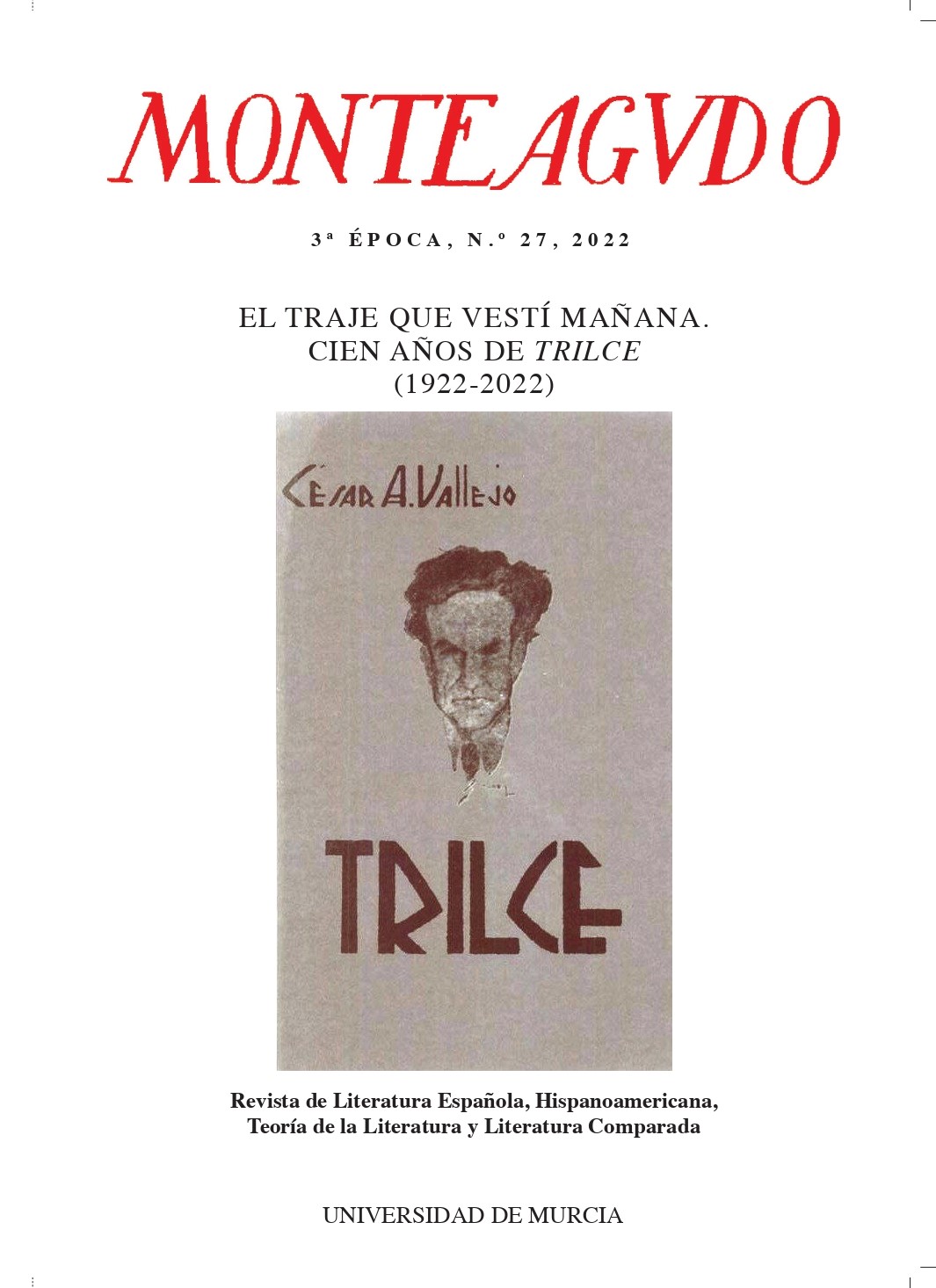Who stumbles on the outside? Poetics of the obstacle and wandering of meaning in César Vallejo y Berta García Faet
Abstract
Los salmos fosforitos (2017), by Berta García Faet, engage in a poetic conversation with Vallejo. Beyond the quotations, glosses, and variations they contain, Los salmos can be read alongside Trilce because they share what we could call an existential luddism, their handling of inadequacy and irreverence, a certain tragicomic spirit and a polyphonic structure. Because they propose a very free work with language and turn the crusher of experimentalism into an inaugural maelstrom. But also and above all because, with all their historical differences, they share an enunciative hesitation and the miracle of a tone: the simultaneity of exaltation and its humorous questioning.
Downloads
-
Abstract707
-
PDF (Español (España))782
References
Ángeles L., César (1999). “César Vallejo y el humor”. Espéculo. Revista de Estudios Literarios. Universidad Complutense de Madrid, n.º 12, http://www.ucm.es/info/especulo/numero12/c_vallej.html
Bajtín, Mijaíl M. (1974). La cultura popular en la edad Media y el Renacimiento. El contexto de François Rabelais. Barcelona, Alianza Universidad.
Bousoño, Carlos (1952). Teoría de la expresión poética (hacía una explicación del fenómeno lírico a través de textos españoles). Madrid, Editorial Gredos.
Dalmaroni, Miguel (2001). “Juan Gelman: del poeta-legislador a una lengua sin estado”. Orbis Tertius, año 4, n.º 8, 1-15.
Deleuze, Gilles (2005). Lógica del sentido. Barcelona, Paidós.
Díaz Herrera, Jorge (1991). “Y también el humor en la poesía de Vallejo”. Cuadernos Hispanoamericanos, n.º 492, junio, 7-22.
Franco, Jean (1988). “La Temática de Los Heraldos Negros a los Poemas Póstumos”. En Ferrari, Américo (coord.). César Vallejo. Obra poética. Colección Archivos, ALLCA XX, 575-605.
García Faet, Berta (2017). Los salmos fosforitos. Madrid, La Bella Varsovia.
García Faet, Berta (2020). “La poesía de Emma Villazón. Figuras alternativas de hijas y niños: sin padres, sin patrias, sin patrón”. En Martínez, Erika. Materia frágil. Poéticas para el siglo XXI en América Latina y España. Madrid/Frankfurt, Iberoamericana/Vervuert, 225-246.
García Lorca, Federico (1966). Obras Completas. Madrid, Aguilar.
Geist, Anthony (1980). La poética de la generación del 27 y las revistas literarias: De la vanguardia al compromiso. Madrid, Guadarrama.
Grotjahn, Martin (1961). Psicología del humorismo. Madrid, Ediciones Morata.
Martínez, Erika (2017). “Políticas estéticas del pensamiento bajtiniano: hacia una dialogía poética”. Badebec, vol. 7, n.° 13, septiembre, 240-259.
López Vega, Martín (2017). “Berta García Faet, identidad y reescritura” (entrevista). El Cultural. Rima Interna, 3 de abril, URL: https://elcultural.com/berta-garcia-faet-identidad-y-reescritura.
Ortega, Julio (1988). “La hermenéutica vallejiana y el hablar materno”. En Ferrari, Américo (coord.). César Vallejo. Obra poética. Colección Archivos, ALLCA XX, 606-620.
Ortega, Julio (1992). “Cien años de Vallejo”. INTI, otoño, n.º 36, 3-10.
Pizarnik, Alejandra (2001). Poesía (1955-1972). Barcelona, Lumen.
Pueyo Zoco, Víctor M. (2010). “Desnúdese el desnudo. Para seguir leyendo los Poemas humanos de César Vallejo”. Aula Lírica. Revista sobre poesía ibérica e iberoamericana, n.º 1, 1-16
Rodríguez, Juan Carlos (2001). La norma literaria. Madrid, Debate.
Soria Olmedo, Andrés (2007). Las vanguardias y la generación del 27. Madrid, Visor.
Vallejo, César (1954). El Romanticismo en la lengua castellana. Lima, Juan Mejía Baca & P. L. Villanueva Editores.
Vallejo, César (1979). Obra poética completa. Caracas, Biblioteca Ayacucho
Usandizaga, Helena (2005). “Pero ya me quiero reír: humor e ironía en la poesía de César Vallejo”. En Humberto, Jesús (comp.), César Vallejo: estudios de poética, México DF, Ediciones Eón, 87-118.
Yurkievich, Saúl (1970). Fundadores de la nueva poesía latinoamericana. Vallejo, Huidobro, Borges, Neruda, Paz. Barcelona, Barral Editores.
Yurkievich, Saúl (1990). “Aptitud humorística en “Poemas humanos”. Hispamérica, año 19, n.º 56-57, agosto-diciembre, 3-10.
The works published in this journal are subject to the following terms:
- The Publications Service of the University of Murcia (the publisher) retains the property rights (copyright) of the published works, and encourages and allows their reuse under the license of use indicated in point 2.
© Publications Service, University of Murcia, 2011
- The works are published in the electronic edition of the journal under a Creative Commons Attribution-NonCommercial-NoDerivatives 3.0 Spain license (legal text). They may be copied, used, distributed, transmitted and publicly displayed, provided that: i) the authorship and the original source of their publication (journal, publisher and URL of the work) are cited; ii) they are not used for commercial purposes; iii) the existence and specifications of this license of use are mentioned.







